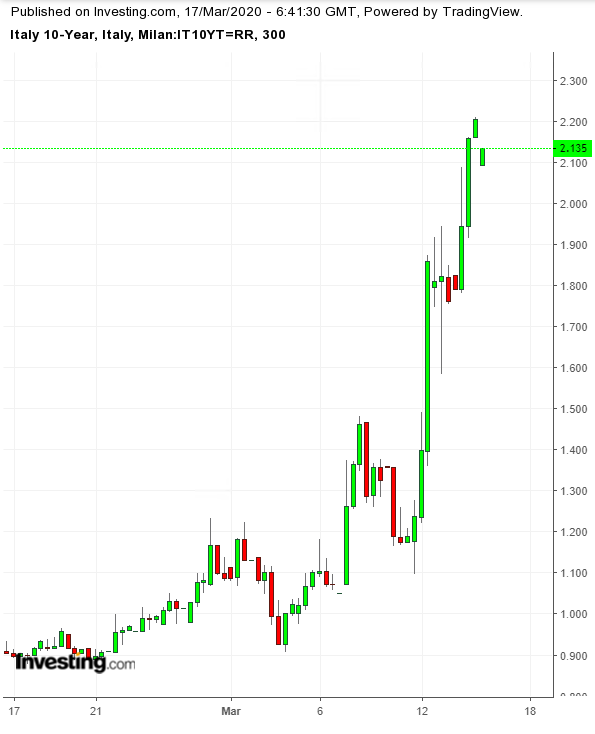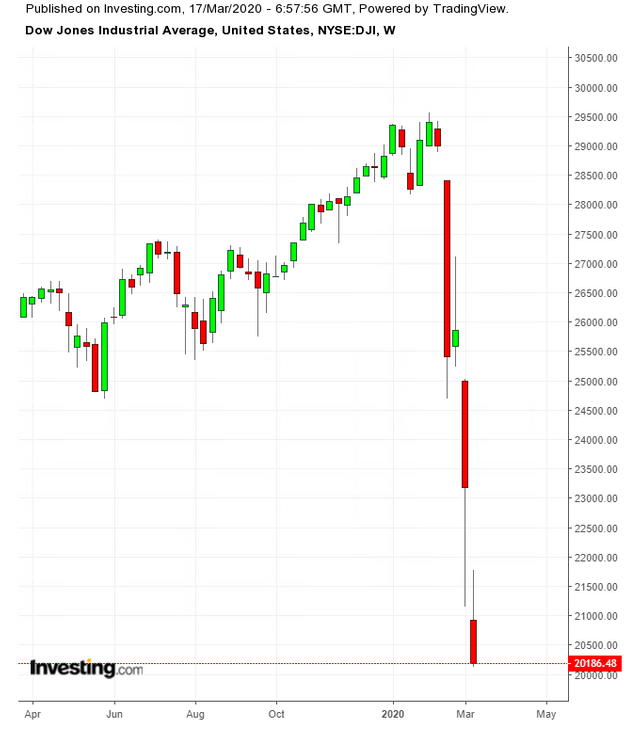It turns out having lawyers instead of economists or central bankers at the head of the world’s two most important central banks kind of works in prosperous times but is a luxury we can ill afford in a crisis.
Both Federal Reserve chair Jerome Powell and European Central Bank president Christine Lagarde have proven themselves not up to the task as their halting responses to the economic impact of the coronavirus pandemic have spectacularly backfired, robbing market participants of the last shreds of confidence in the central bank chiefs. (Those who read French might want to look at the damning verdict of Swiss economic historian Tobias Strautman in an interview with Le Temps.)
Lagarde not only disappointed markets with half-measures at last Thursday’s meeting of the ECB governing council, she had to apologize for sending the market for Italian bonds plunging by saying it wasn’t the ECB’s job to close the spread in sovereign bonds.
Italy 10-Y 300 Minute Chart  Italy 10-Y 300 Minute Chart
Italy 10-Y 300 Minute Chart
One governing council member quoted anonymously in the Financial Times said by way of excusing Lagarde, “She just lost her concentration.” Really?
There were complaints—after his departure—that Mario Draghi was too autocratic in his tenure as Lagarde’s predecessor, often announcing measures without consulting the governing council. But is Europe really better off with a committee of 25 divided policymakers dithering over compromises under a president who is very much on a learning curve?
2008 TOOL KIT NO SOLUTION FOR PANDEMIC-FUELED ECONOMIC CRISIS
Powell, meanwhile, waited too long for the Fed’s first emergency rate cut, made on March 3, of 0.5 percentage points, when an earlier intervention of greater scope might have supported market confidence and mitigated the panic. By the time the Fed came through with a bigger package—this weekend’s announcement of a further 1 percentage-point cut in rates to a virtual zero and restoration of asset purchases to the tune of $700bn, along with liquidity injections and foreign exchange swaps—the damage was already done and participants thought the Fed was just joining in the panic.
Dow Weekly TTM  Dow Weekly TTM
Dow Weekly TTM
On Monday, markets, both global and in the U.S., made that perfectly clear.
There are those that will argue central banks are not the ones to combat the crisis. What is certain is that redeploying the tool kit used in the financial crisis of 2008 is hardly the right solution for the economic crisis unleashed by the pandemic. Some of the technical solutions, such as reducing the discount rate and reserve requirements or increasing repo amounts can relieve the main problem—maintaining credit to businesses—but they are still far from the coordinated official response that is needed.
Remember when Bernanke and U.S. Treasury Secretary Hank Paulson were the faces of the financial crisis, meeting together round the clock? Bernanke wrote his doctoral dissertation on the Great Depression and Paulson spent 32 years working for Goldman Sachs, rising to chief executive at the world’s premier investment bank. He, too, had more credibility than Steven Mnuchin, the former movie producer currently heading the Treasury Department (in fairness Mnuchin also spent many years at Goldman).
In any event, the Fed’s two emergency meetings, the first in between regularly scheduled meetings of the Federal Open Market Committee since the financial crisis, have taken the place of the scheduled in-person meeting this week.
In the conference call with the press on Sunday, Powell dodged a specific question about the lack of coordination between Treasury and the Fed by blandly saying each party has its own tools and responsibilities. In general, as with another question about the Financial Stability Oversight Council, Powell’s answers focused on process—group calls, regular contact, whatever—rather than policies or solutions.
What's missing now is an experienced, creative thinker to figure out what is needed in this unique crisis. It is hard to imagine a Ben Bernanke, Janet Yellen, or Mario Draghi, let alone a Paul Volcker, temporizing in the manner of Powell and Lagarde.
What would these central bankers of yore do in this situation? We don’t know, because they are no longer in charge. Instead, the B-team is in and we can only hope they will somehow muddle through.
Warning! This user is on our black list, likely as a known plagiarist, spammer or ID thief. Please be cautious with this post!
If you believe this is an error, please chat with us in the #appeals channel in our discord.
Downvoting a post can decrease pending rewards and make it less visible. Common reasons:
Submit